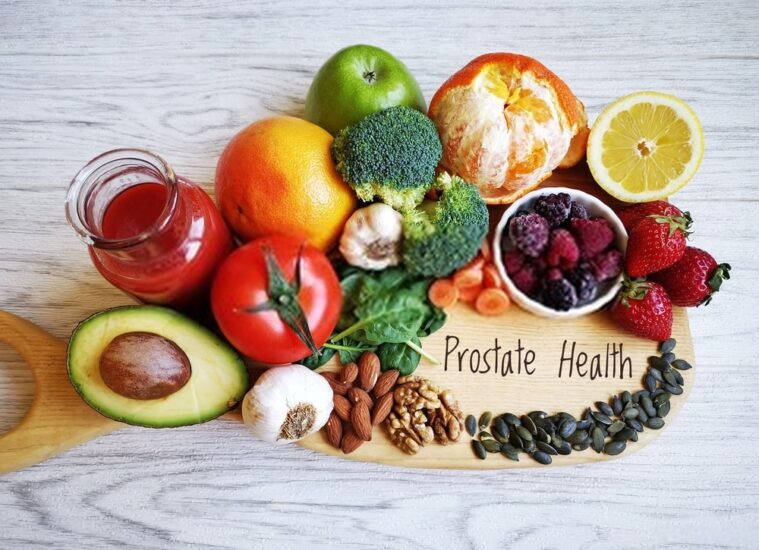Protect Prostate Health by Consuming this Potent Ingredient

Several studies have recommended that specific nutrients reduce the risk of prostate cancer or prostate enlargement, also identified as benign prostatic hyperplasia (BPH), a typical condition suffered by half of all men over 50. However, the research is far from conclusive, & there’s controversy about which nutrients help and why.
This handout is for men looking to decrease their risk of prostate cancer but who have not had prostate cancer.
Good health and reducing cancer risk can start with eating a plant-based diet, being physically active, and having a healthy weight. To decrease your prostate cancer risk, I also recommended it to include foods rich in lycopene and selenium and avoided having too much calcium.
What is the actual meaning of Prostate Health?
Your prostate is a walnut-sized muscle gland below your bladder and handles secreting prostate fluid, which helps the flow of seminal fluid. As part of the male reproductive system, your prostate gland enlarges significantly during your teenage years, nearly doubling, and will continue to grow for the rest of your life. Sometimes, the prostate may become more significant than average, and a condition called benign prostatic hyperplasia (BPH). An enlarged prostate gland can pressure your urinary tract and impair the flow of urine from your bladder.
Let’s the extraordinary knowing steps to protect your prostate health:
- Eat a well-balanced diet food, low in fat, with four or more portions of fruits and vegetables each day.
- Doing Exercise regularly to maintain a healthy weight and avoid gaining “belly fat.”
- Drink plenty of fluids to keep your prostate and urinary system functioning correctly.
- Reduce your stress or anxiety to keep your immune system strong.
- Don’t smoke.
- Limit alcohol and caffeine consumption.
- Get enough rest.
It has also linked specific vitamins and minerals to better prostate health, including vitamin C, lycopene, and zinc. Boost your intake with the following foods:
Legumes
Legumes such as beans, peanuts, and lentils are beneficial for inhibiting prostate cancer as it includes biologically active plant compounds known as phytoestrogens. Isoflavones are one such phytoestrogen that is decent in legumes. They may have cancer-fighting properties, which help in suppressing tumor growth in prostate cancer cells.
Oily Fish
Oily freshwater fish such as salmon, sardines, mackerel, trout, and herring are all rich in omega-3 fatty acids that have been shown to diminish inflammation. Recent research found that diets rich in omega-3 helped prevent the growth and spread of prostate cancer cells and suggested that deficiency may contribute to prostate issues. Fildena and Vidalista 60 is an excellent remedy to improve men’s health prostate health.
The standard western diet has an imbalance of omega-3 and six fatty acids. While pro-inflammatory omega 6’s (such as those in vegetable oil) are essential to defend the body from infection and injury, they can also cause damage in high quantities. We need more anti-inflammatory omega-3 to balance out their influences. Try to eat two pieces of fish each week, one of which should be oily, to consume sufficient levels of omega-3.
Green Tea
Green tea is a beverage that serves as a perfect drink for detoxifying the body and decreases the risk of developing prostate-related problems. However, one has to consume more cups of green tea to prevent the threat of prostate problems or cancer indeed.
Tomatoes are high in phytonutrient lycopene.
It encouraged men with or without prostate cancer to consume various vegetables, comprising cooked tomatoes. Lycopene is a well-studied antioxidant in the battle against prostate cancer. They cook tomatoes, and eating them with a small amount of healthy fat increases the body’s ability to absorb lycopene. We do not recommend that men take a separate lycopene supplement.
One-half bowl of cruciferous vegetables a day can diminish the risk for chronic prostate cancer in men with non-metastatic prostate cancer is the suggestion in a hopeful new study. Cruciferous vegetables add cauliflower, Brussels sprouts, cabbage, chard, arugula, broccoli, kale, and more.
Soy
In 2018, researchers looked at all the excellent science on how soy affects prostate cancer risk to see an overarching pattern. There was: Soy consumption – think tofu, edamame, tempeh, and soy milk was connecting to a reduced uncertainty of prostate cancer, perhaps due in part to the foods is flavones, a type of plant compound, or phytochemical. It makes sense when you look at Asia, where prostate cancer incidence is low, and soy consumption is high. The study recommends eating a few meals a week that contain soy. Aurogra 100 is a potent remedy to reduce men’s health disease.
Fire up the grill
For cruciferous veggies, that is. Vegetables in the cabbage family, like cauliflower, broccoli, and Brussels sprouts, are known for their link to a decreased risk of cancer. Nearly any vegetable is quickly grilled using a little oil also a grill pan (to keep the tasty bits from dropping through the grates). Try a roasted cabbage salad. Cut ahead of cabbage into quarters, leaving the core intact. Brush with oil to prevent sticking grill on each side for 3-4 minutes until it marked the outside, but the inside remains crunchy. Sprinkle with a honey mustard dressing and top with fresh tomatoes.
Phytosterols (In-plant Foods!)
Plant sterols, or phytosterols, are cholesterol-like molecules in small amounts in grains, veggies, fruits, nuts, and seeds. But something well known to them for lowering LDL or “bad” cholesterol.
Be sure to include various plant foods in your diet because plant foods are full of these beneficial sterols. It is one reason I think vegan diets help fight prostate diseases. Tadalista or Vidalista 40 is the best remedy to treat men’s health diseases.
In several clinical trials, supplemental dosing with phytosterols has caused improvement in the symptoms of an enlarged prostate. A review of four clinical trials showed that plant sterols increased urinary flow in men with enlarged prostates. In hamsters fed phytosterols, prostate sizes decreased, and researchers said that 5α-reductive was inhibiting.
Takeaway
If you have noticed changes or are concerns about your prostate’s health, consult with your doctor. While often harmless, your doctor will rule out any serious complications and set your mind at ease.









Comments are closed.